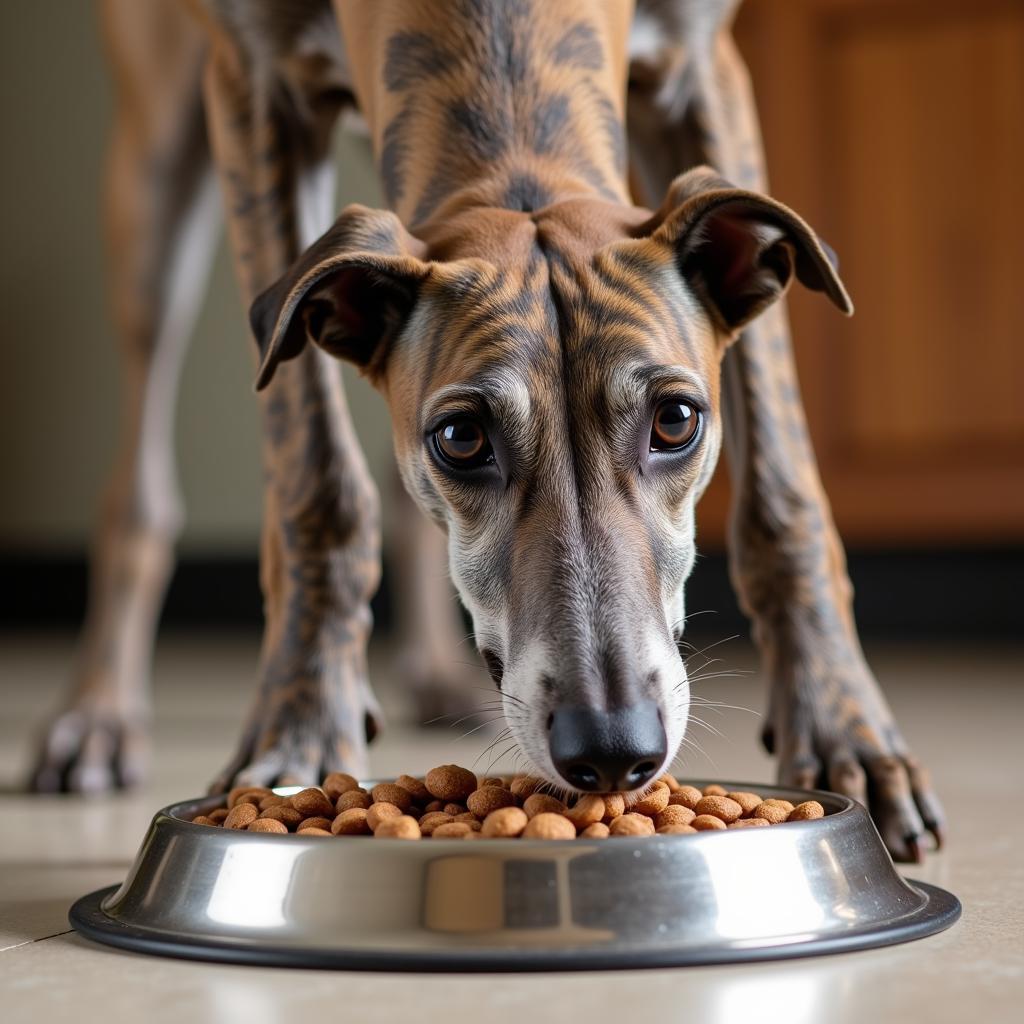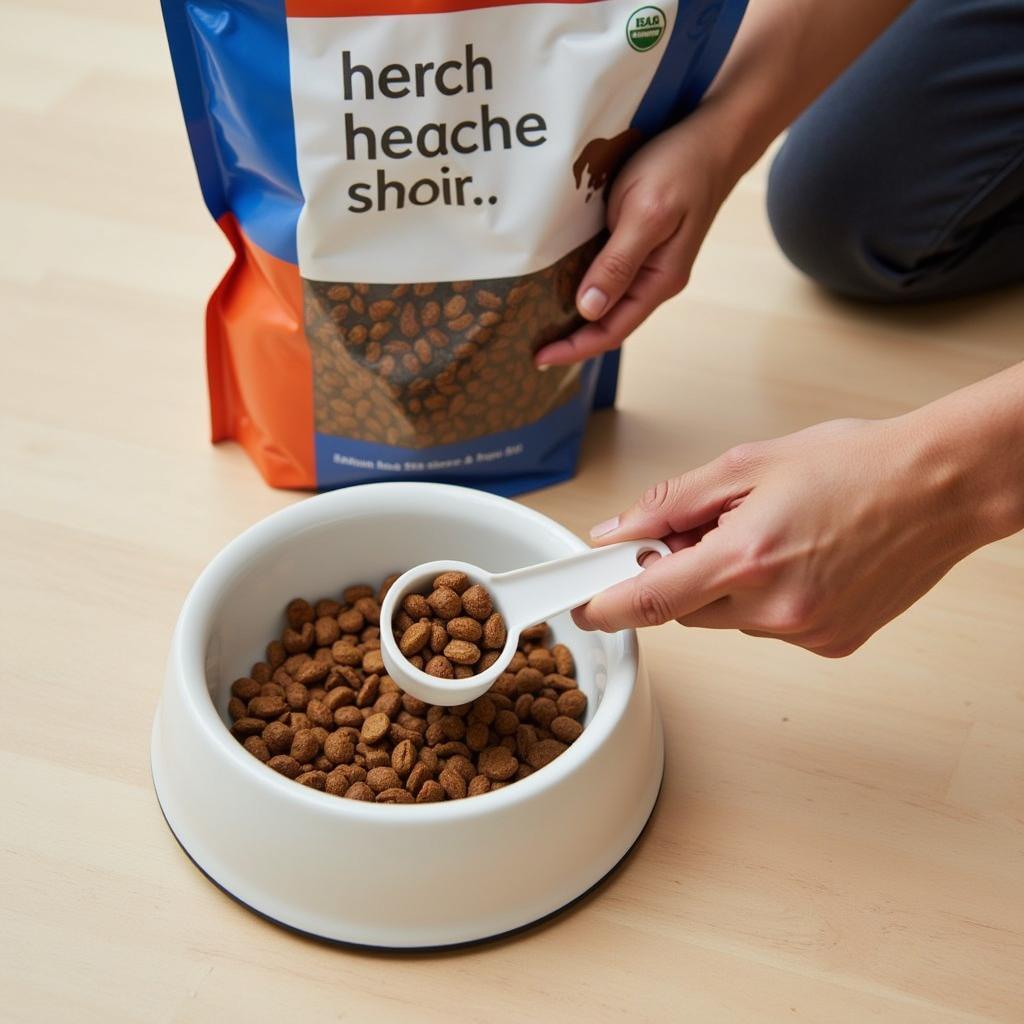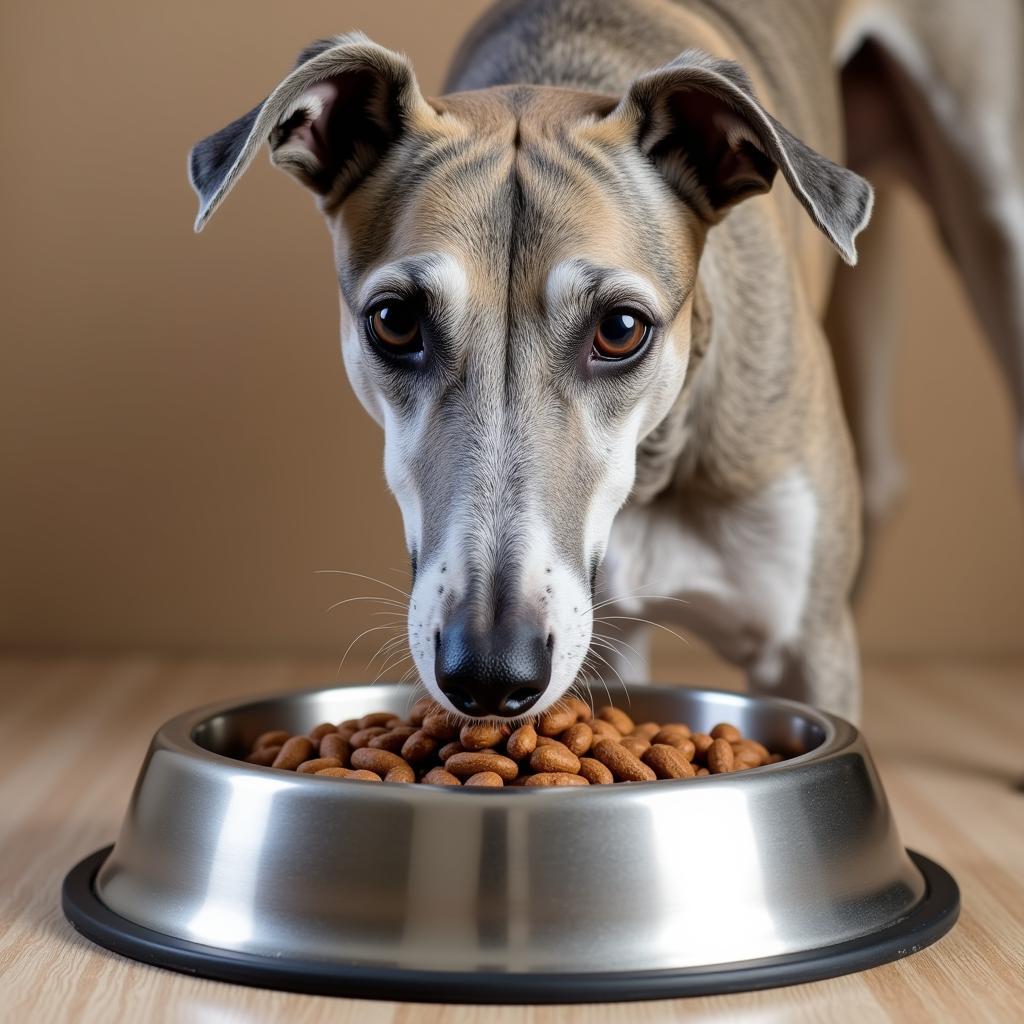Finding the Best Food For Greyhounds can be a challenge. These sleek athletes have specific dietary needs that cater to their high-energy lifestyles and unique physiology. Proper nutrition is crucial for maintaining their lean muscle mass, shiny coat, and overall well-being. This article will delve into the nutritional requirements of greyhounds and guide you in choosing the best food for your furry friend.
Understanding Greyhound Nutritional Needs
Greyhounds, known for their incredible speed and agility, require a diet that supports their athletic build. Their metabolism is geared towards short bursts of intense activity, and their nutritional needs reflect this. A balanced diet for a greyhound should be rich in high-quality protein to maintain muscle mass, healthy fats for energy and a glossy coat, and carbohydrates for sustained energy levels. Vitamins and minerals are essential for overall health and to support their unique bone structure. Understanding the specific needs of your greyhound is crucial in making the right food choices.
Key Nutrients for Optimal Greyhound Health
Protein is the building block of muscle tissue, and active breeds like greyhounds require a higher protein intake than less active breeds. Look for dog food with animal-based protein sources like chicken, beef, lamb, or fish. Healthy fats, such as those found in fish oil and flaxseed, are essential for a healthy coat, skin, and joint function. These fats also provide a concentrated source of energy. Carbohydrates offer sustained energy and fiber for digestive health. Opt for complex carbohydrates like brown rice and sweet potatoes over simple carbohydrates.
Choosing the Right Type of Food
When selecting the best food for greyhounds, you have a few options: dry kibble, wet food, or raw diets. Dry kibble is convenient and cost-effective, offering a complete and balanced diet in a crunchy form that can also promote dental health. Wet food is often more palatable for picky eaters and can be beneficial for greyhounds who need extra hydration. Raw diets have gained popularity, but it’s crucial to consult with a veterinarian before switching to a raw food diet to ensure it meets your greyhound’s nutritional needs and avoids potential health risks.
 Greyhound Enjoying a Meal of Kibble
Greyhound Enjoying a Meal of Kibble
What to Look for in Greyhound Dog Food Ingredients
Always check the ingredient list on your greyhound’s food. Avoid foods with artificial colors, flavors, and preservatives. Fillers like corn and wheat should also be minimized as they can contribute to weight gain and digestive issues. Look for foods that list meat as the first ingredient, indicating a higher protein content.
“A high-quality diet is essential for a greyhound’s overall health and performance,” says Dr. Emily Carter, a veterinary nutritionist with over 15 years of experience. “Look for foods specifically formulated for active breeds, ensuring they contain adequate protein, healthy fats, and essential vitamins and minerals.”
Feeding Schedule and Portion Control
How much and how often you feed your greyhound depends on their age, weight, activity level, and the specific food you choose. Follow the feeding guidelines on the food packaging as a starting point and adjust as needed. Divide the daily portion into two or three meals to prevent bloating. Avoid free-feeding, as this can lead to obesity.
 Carefully Measuring a Greyhound's Food Portion
Carefully Measuring a Greyhound's Food Portion
Common Feeding Issues in Greyhounds
Some greyhounds are prone to sensitive stomachs or food allergies. If your greyhound experiences digestive upset, skin issues, or other symptoms after eating, consult with your veterinarian. They can help identify potential food allergies and recommend a hypoallergenic or limited-ingredient diet. Bloat is a serious condition that can affect deep-chested breeds like greyhounds. Prevent bloat by feeding smaller, more frequent meals and avoiding strenuous exercise immediately after eating.
Is a Special Diet Necessary for Retired Racing Greyhounds?
Retired racing greyhounds may have different nutritional needs than their non-racing counterparts. They often require fewer calories since they are no longer engaging in intense training. However, they still need a high-quality diet to maintain muscle mass and overall health. Consult with your veterinarian to determine the appropriate calorie intake and dietary adjustments for a retired racer.
“Retired racers can thrive on a slightly lower-calorie diet but still require a balance of nutrients to support their health in their golden years,” adds Dr. Carter. “Regular checkups and discussions with a veterinarian can help tailor a diet specific to their individual needs.”
 Senior Greyhound Enjoying a Meal
Senior Greyhound Enjoying a Meal
Conclusion
Choosing the best food for greyhounds requires careful consideration of their specific nutritional requirements. By understanding their needs and selecting a high-quality diet, you can help your greyhound maintain their lean physique, vibrant energy, and overall well-being. Remember to consult with your veterinarian for personalized advice and to address any specific dietary concerns. Providing the best food for your greyhound is an investment in their long-term health and happiness.
FAQ
- What is the best type of protein for a greyhound? Animal-based proteins like chicken, beef, lamb, and fish are excellent sources.
- How much should I feed my greyhound? Follow the guidelines on the food packaging and adjust based on your dog’s individual needs.
- Can greyhounds eat raw food? Consult with your veterinarian before switching to a raw diet.
- What are signs of food allergies in greyhounds? Digestive upset, skin issues, and itching can be signs of food allergies.
- How can I prevent bloat in my greyhound? Feed smaller, more frequent meals and avoid strenuous exercise after eating.
- Do retired racing greyhounds need a special diet? They may need fewer calories but still require a balanced, high-quality diet.
- Should I consult with a veterinarian about my greyhound’s diet? Yes, a veterinarian can provide personalized recommendations based on your dog’s specific needs.
Need further assistance? Contact us! Phone: 02437655121, Email: minacones@gmail.com Or visit our address: 3PGH+8R9, ĐT70A, thôn Trung, Bắc Từ Liêm, Hà Nội, Việt Nam. We have a 24/7 customer service team.